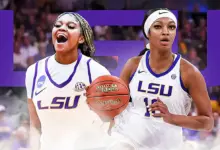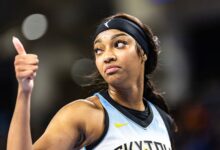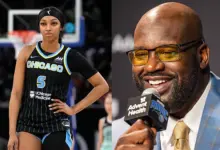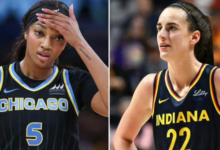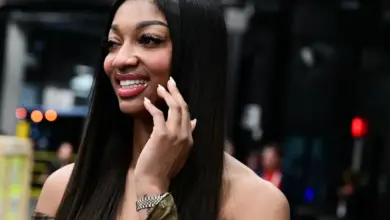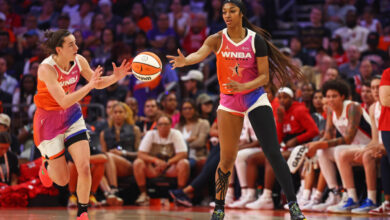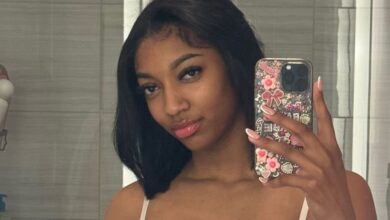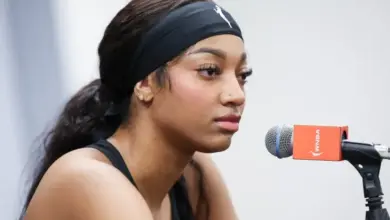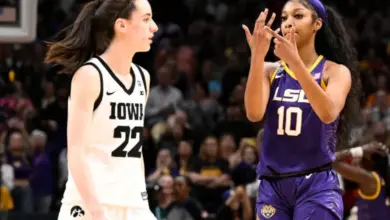Angel Reese is weaving culture deeper into the fabric of the WNBA
The star Chicago Sky rookie is an important part of the league’s continual growth on and off the court
Then there’s the on-court style and impact that Black women in the W have had since the days of the iconic red lipstick Tina Thompson wore as one of the faces of the Houston Comets. Wilson pointed to Diggins-Smith and Parker as other original on-court influencers.
“I think the effect that Skylar really had. It was just a tie headband. She really had all the young girls doing the ninja tie headband,” Wilson added.
“Even when it came to Candace – baby hairs. You saw Candace and you saw baby hairs and she still does it. Me, the one leg sleeve. We all bring something that’s amazing to help impact the culture. I think Angel is doing a great job of that as well.”
Despite Reese’s growing overlap in pop culture, particularly Black music culture, the perception of her impact at the national level in aiding in the growth of the game can still feel at times undervalued. That’s nothing new, says Wallace.
“I think that traditionally mainstream [media] has been geared towards a certain style or genre that doesn’t always align with something like a SZA or an Angel Reese,” Wallace said. “I think that a lot of times we tend to elevate voices that aren’t the Black voices – Black women especially. We’ve seen it in culture so many times.”

DAVID BECKER/NBAE VIA GETTY IMAGES
“For me, it’s about showing that I’m not just a basketball player. I’ve built a platform outside of basketball and I think that’s why a lot of people love me. I have nails, I have hair, lashes – I’m the Barbie. A lot of little girls look up to that, they say I want to be like you. They want to wear pink. They want to do girly stuff but also be a dawg on the court.”
Perhaps it’s a misunderstanding of what Reese’s presence – or any WNBA player’s presence in those non-basketball, pop culture spaces – means. As the sport continues to grow, reaching the casual fan or those unfamiliar with the league as a whole through a shared artist’s post or medium provides endless opportunities to grow the league’s base.
“They have eyes on them as well,” Hamby said of the celebrities who through their interactions with players can also cross-promote the WNBA. “People are watching them and are like, ‘Oh, they watch this; let me see what that is.’ ”
This is all particularly notable as the league itself has increasingly leaned into the incorporation of Black culture and music to help stimulate its growth. When Toronto officially announced its new expansion team in May, rapper Drake was present as a Toronto ambassador.
The newly minted Golden State Valkyries celebrated their team’s announcement with a Block Party with rapper E-40 and R&B artist Kehlani — who also performed at last year’s All-Star Game halftime show. Halftime performers during last year’s WNBA Finals between the Aces and Liberty included Remy Ma, Jim Jones, Too Short and Lil Kim.
When it comes to valuing and equally weighing the contributions that players like Wilson, Reese and other Black players in particular are making by interacting with the culture, it’s necessary to first recognize the variety of ways that exist to grow the sport. Wallace is confident that this new generation of Black players will command an acknowledgement of their method of impact.
“I know how Angel Reese is built. I know how A’ja Wilson is built. I don’t see [the undervaluing of their impact] being allowed to happen any more as we continue to move forward,” Wallace said.
Reese’s offcourt star power is amplified by the fact that she is playing at an elite level during her rookie season.
Reese, who was the youngest All-Star in Saturday night’s contest, has amassed a league-leading 17 double-doubles through 23 games this season. She broke Parker’s record for most consecutive double-doubles in WNBA history, ending the streak earlier this month at 15 straight. She is just five double-doubles shy of breaking the single-season double-doubles record set by TIna Charles 14 years ago. Reese currently ranks second in the WNBA in rebounds per game (11.9 rpg) behind MVP favorite Wilson (12.0 rpg). Should both players sustain their output through the end of the season, Reese would tie Minnesota Lynx legend Sylvia Fowles for the second-highest single-season rebounding average in WNBA history.
At the Olympic break, Reese is averaging 13.5 points, 11.9 rebounds and 1.8 assists for Chicago.
“She’s a dawg, that’s why I’m a fan of her,” said Skylar.
In many ways, Reese is confidently and boldly stepping through the doors opened by the generations of WNBA players before her that created opportunities for players to exist beyond basketball and without confines. That, combined with the generational tool of social media has made Reese the perfect figure to resonate with fan bases in and out of the basketball space – all this while she continues to find All-Star level success on the court.
“For me, it’s about showing that I’m not just a basketball player,” said Reese, who became the first rookie to record a double-double in the WNBA All-Star Game. “I’ve built a platform outside of basketball and I think that’s why a lot of people love me. I have nails, I have hair, lashes – I’m the Barbie. A lot of little girls look up to that, they say I want to be like you. They want to wear pink. They want to do girly stuff but also be a dawg on the court. …
“I think that’s another reason why people gravitate towards me – the rappers, singers, [the] culture as well.”
Then there’s the on-court style and impact that Black women in the W have had since the days of the iconic red lipstick Tina Thompson wore as one of the faces of the Houston Comets. Wilson pointed to Diggins-Smith and Parker as other original on-court influencers.
“I think the effect that Skylar really had. It was just a tie headband. She really had all the young girls doing the ninja tie headband,” Wilson added.
“Even when it came to Candace – baby hairs. You saw Candace and you saw baby hairs and she still does it. Me, the one leg sleeve. We all bring something that’s amazing to help impact the culture. I think Angel is doing a great job of that as well.”
Despite Reese’s growing overlap in pop culture, particularly Black music culture, the perception of her impact at the national level in aiding in the growth of the game can still feel at times undervalued. That’s nothing new, says Wallace.
“I think that traditionally mainstream [media] has been geared towards a certain style or genre that doesn’t always align with something like a SZA or an Angel Reese,” Wallace said. “I think that a lot of times we tend to elevate voices that aren’t the Black voices – Black women especially. We’ve seen it in culture so many times.”

DAVID BECKER/NBAE VIA GETTY IMAGES
“For me, it’s about showing that I’m not just a basketball player. I’ve built a platform outside of basketball and I think that’s why a lot of people love me. I have nails, I have hair, lashes – I’m the Barbie. A lot of little girls look up to that, they say I want to be like you. They want to wear pink. They want to do girly stuff but also be a dawg on the court.”
Perhaps it’s a misunderstanding of what Reese’s presence – or any WNBA player’s presence in those non-basketball, pop culture spaces – means. As the sport continues to grow, reaching the casual fan or those unfamiliar with the league as a whole through a shared artist’s post or medium provides endless opportunities to grow the league’s base.
“They have eyes on them as well,” Hamby said of the celebrities who through their interactions with players can also cross-promote the WNBA. “People are watching them and are like, ‘Oh, they watch this; let me see what that is.’ ”
This is all particularly notable as the league itself has increasingly leaned into the incorporation of Black culture and music to help stimulate its growth. When Toronto officially announced its new expansion team in May, rapper Drake was present as a Toronto ambassador.
The newly minted Golden State Valkyries celebrated their team’s announcement with a Block Party with rapper E-40 and R&B artist Kehlani — who also performed at last year’s All-Star Game halftime show. Halftime performers during last year’s WNBA Finals between the Aces and Liberty included Remy Ma, Jim Jones, Too Short and Lil Kim.
When it comes to valuing and equally weighing the contributions that players like Wilson, Reese and other Black players in particular are making by interacting with the culture, it’s necessary to first recognize the variety of ways that exist to grow the sport. Wallace is confident that this new generation of Black players will command an acknowledgement of their method of impact.
“I know how Angel Reese is built. I know how A’ja Wilson is built. I don’t see [the undervaluing of their impact] being allowed to happen any more as we continue to move forward,” Wallace said.
Reese’s offcourt star power is amplified by the fact that she is playing at an elite level during her rookie season.
Reese, who was the youngest All-Star in Saturday night’s contest, has amassed a league-leading 17 double-doubles through 23 games this season. She broke Parker’s record for most consecutive double-doubles in WNBA history, ending the streak earlier this month at 15 straight. She is just five double-doubles shy of breaking the single-season double-doubles record set by TIna Charles 14 years ago. Reese currently ranks second in the WNBA in rebounds per game (11.9 rpg) behind MVP favorite Wilson (12.0 rpg). Should both players sustain their output through the end of the season, Reese would tie Minnesota Lynx legend Sylvia Fowles for the second-highest single-season rebounding average in WNBA history.
At the Olympic break, Reese is averaging 13.5 points, 11.9 rebounds and 1.8 assists for Chicago.
“She’s a dawg, that’s why I’m a fan of her,” said Skylar.
In many ways, Reese is confidently and boldly stepping through the doors opened by the generations of WNBA players before her that created opportunities for players to exist beyond basketball and without confines. That, combined with the generational tool of social media has made Reese the perfect figure to resonate with fan bases in and out of the basketball space – all this while she continues to find All-Star level success on the court.
“For me, it’s about showing that I’m not just a basketball player,” said Reese, who became the first rookie to record a double-double in the WNBA All-Star Game. “I’ve built a platform outside of basketball and I think that’s why a lot of people love me. I have nails, I have hair, lashes – I’m the Barbie. A lot of little girls look up to that, they say I want to be like you. They want to wear pink. They want to do girly stuff but also be a dawg on the court. …
“I think that’s another reason why people gravitate towards me – the rappers, singers, [the] culture as well.”
As fans trickled out of the Barclays Center following a regular-season mid-July matchup that featured the New York Liberty and Chicago Sky, many walked the short distance to the Atlantic Avenue subway stop that stands just steps from the Brooklyn, New York, arena.
While the game was won by the hometown Liberty, the buzz amongst patrons centered on the rising star of the opposing team, rookie Sky forward Angel Reese.
Standing in front of the subway entrance above ground, a large group of over 30 — a mix of adults and children, all of whom are Black — pose for a photo in custom Angel Reese T-shirts. Down below, a pair of Black sisters dance in front of the turnstiles to the latest TikTok viral song — their mom recording them as an intensely decorated poster dedicated to Reese lays on the floor. Skylar, age 10, has on a Reese No. 5 Sky jersey, while Jah’nae, age 17, rocks a Reese T-shirt.
When asked what makes her a fan of Reese, Jah’nae’s response focused just as much on Reese’s off-court success as her play.
“Her game just draws me into liking her,” Jah’nae said. “I play basketball, too. Watching her, I think I could do what she does. She doesn’t care what the outside has to say. I think a lot about what other people say, and she doesn’t. She just does what she does, every day.”
Jah’nae was also drawn to Reese’s celebrity off the court — Reese’s interactions with some of today’s biggest musical artists from Glorilla to Cardi B and Megan Thee Stallion caught her eye.
Reese’s integration into the pop culture space is an important aspect of her presence in the WNBA that has, at times, felt understated by the masses. It represents an important aspect of Reese’s contribution to the game’s rapid growth. While cultural crossovers between the entertainment industry and the WNBA have existed since the league’s inception, Reese appears positioned to be a part of the group at the forefront of further weaving the culture into the WNBA fabric.
“I’ve met Beyoncé. I’ve met Megan [Thee Stallion]. I was just texting Megan this morning, I’m going to send her a jersey. I think that’s the difference between me and a lot of players. … I’m not just a basketball player. The rappers. The singers. Everyone knows who I am,” Reese said before the July 11 game versus the Liberty. “They come out to the games to support.”
Esther Wallace, founder of the streetwear clothing brand Playa Society, put it plainly:
“Angel is different.”

MELISSA TAMEZ/ICON SPORTSWIRE VIA GETTY IMAGESE
Popular culture has always been present in women’s professional basketball. It started with the 1996 women’s national team, after winning gold at the Atlanta Olympics, appearing on the television show “Martin” that fall.
“Everybody remembers that. The culture has always been there,” said Wallace.
The episode served as another medium to introduce women’s professional basketball to the casual fan, and felt like a harbinger for the sport to continue utilizing the culture to increase its visibility. In 1999 at Madison Square Garden, Whitney Houston sang the national anthem at the first-ever WNBA All-Star Game. Another moment came in 2000 with the WNBA’s incorporation into the cult classic movie “Love and Basketball.”
Over time, however, moments like that became more infrequent.
“When the investment isn’t there or we lose sight of what the product is, I think that’s when it started to diminish a little bit or we had that period of time where we didn’t see it,” Wallace said.
In recent years, however, there’s been a sense of reinvigoration around moments of cultural integration within the WNBA – particularly within the music industry. The consistency and magnitude of those interactions, which occur today at a more individual level, have seemingly been the strongest they’ve ever been.
The league’s top talent agrees that the uptick seen in those moments unequivocally contribute to the growth of the game.
“It’s huge especially with women being the arbiters of so much culture, Black people being the arbiters of so much culture, all of the intersection of sports, culture, music, entertainment — I think it’s a great way to take a pulse on society,” Seattle Storm forward Nneka Ogwumike said during WNBA All-Star Weekend. “For the WNBA to be kind of at the intersection of all of that, I’m really grateful.”
“I think people are appreciating what we are doing as athletes,” added Storm guard Jewell Loyd. “I think from the music side, artists want to be athletes and athletes want to be artists. It’s been really great to see the growth of women supporting women.”
One of the league’s biggest cultural drivers has been Reese. Just in the first half-season of her professional career, Reese’s crossover starpower has been on full display.
- During a recent episode of Club Shay Shay with host Shannon Sharpe, featured guest Megan Thee Stallion, referenced a basketball hoop that she has in a studio she records in. Occasionally, she said, the rapper will casually take shots on the hoop, stating “I be thinking I’m really Angel Reese.” The episode has over 2 million views on YouTube.
- In May, Reese joined Megan on stage during her tour stop in Chicago.
- In early July, after Reese notched her 12th straight double-double against the Seattle Storm, R&B artist SZA, who has more than 20 million followers on Instagram, posted a story in support of the budding rookie star. “Go crazy! I gotta go see her play,” SZA posted.
- After the Sky’s win against the Atlanta Dream on July 2, Reese was seen connecting with R&B artist Monica, who posted Reese to her Instagram story with audio of her classic song “Angel of Mine” overlaid on the post. The Grammy winner has a Instagram following of over 13 million.
- Rapper Latto attended Reese’s pro debut on May 15 in Dallas against the Wings. What brought her out to College Park Center? “Angel Reese,” Latto said directly to the camera in a sound byte that has since become a meme amongst women’s basketball Twitter.
- On July 16, after the Sky defeated the Aces in Las Vegas, Reese recorded a TikTok with Usher in which the R&B star flipped his patented phrase “Ursher, baby” to “Angel, baby.” The video has over 3.6 million views.
- Reese has also been seen postgame interacting with artists ranging from Lil Durk to G Herbo
“I think she really brought in other celebrities from different entertainment factors,” said Las Vegas Aces forward A’ja Wilson, who has also been a key contributor to bringing those cultural moments to the W. “The things that she’s done. The collabs that she’s had, it’s truly amazing to watch and I hope it continues to grow.”

MELANIE FIDLER/NBAE VIA GETTY IMAGES
Reese is a product of the WNBA’s past cultural needle movers. This year’s group of WNBA All-Stars chose an array of players when asked to name who they first recalled bringing that sense of cultural integration to the league.
For Los Angeles Sparks forward Dearica Hamby, that player was Skylar Diggins-Smith.
“Skylar was the first that kind of started it,” Hamby said. “I think she was the first that kind of brought eyes to our league in a different way.”
Ogwumike referenced Cappie Pondexter as one of the first she noticed to branch outside of solely being an athlete, a blueprint she believed was created by Candace Parker.
One name that rang consistent amongst the group, including Reese, was Hall of Famer Lisa Leslie.
“I think Lisa was also someone we saw who wasn’t just considered a basketball player, I think she branched outside the confines of just being an athlete,” Ogwumike said.
Said Wallace: “Lisa Leslie was everywhere. I think Lisa Leslie was on an episode of Moesha. I really think Lisa Leslie, she was her. She had these cultural aspects of her game where she was iconic. She had the red lips, she had the shorts. I think that that’s really one of the earliest representations of it.”
Then there’s the on-court style and impact that Black women in the W have had since the days of the iconic red lipstick Tina Thompson wore as one of the faces of the Houston Comets. Wilson pointed to Diggins-Smith and Parker as other original on-court influencers.
“I think the effect that Skylar really had. It was just a tie headband. She really had all the young girls doing the ninja tie headband,” Wilson added.
“Even when it came to Candace – baby hairs. You saw Candace and you saw baby hairs and she still does it. Me, the one leg sleeve. We all bring something that’s amazing to help impact the culture. I think Angel is doing a great job of that as well.”
Despite Reese’s growing overlap in pop culture, particularly Black music culture, the perception of her impact at the national level in aiding in the growth of the game can still feel at times undervalued. That’s nothing new, says Wallace.
“I think that traditionally mainstream [media] has been geared towards a certain style or genre that doesn’t always align with something like a SZA or an Angel Reese,” Wallace said. “I think that a lot of times we tend to elevate voices that aren’t the Black voices – Black women especially. We’ve seen it in culture so many times.”

DAVID BECKER/NBAE VIA GETTY IMAGES
“For me, it’s about showing that I’m not just a basketball player. I’ve built a platform outside of basketball and I think that’s why a lot of people love me. I have nails, I have hair, lashes – I’m the Barbie. A lot of little girls look up to that, they say I want to be like you. They want to wear pink. They want to do girly stuff but also be a dawg on the court.”
Perhaps it’s a misunderstanding of what Reese’s presence – or any WNBA player’s presence in those non-basketball, pop culture spaces – means. As the sport continues to grow, reaching the casual fan or those unfamiliar with the league as a whole through a shared artist’s post or medium provides endless opportunities to grow the league’s base.
“They have eyes on them as well,” Hamby said of the celebrities who through their interactions with players can also cross-promote the WNBA. “People are watching them and are like, ‘Oh, they watch this; let me see what that is.’ ”
This is all particularly notable as the league itself has increasingly leaned into the incorporation of Black culture and music to help stimulate its growth. When Toronto officially announced its new expansion team in May, rapper Drake was present as a Toronto ambassador.
The newly minted Golden State Valkyries celebrated their team’s announcement with a Block Party with rapper E-40 and R&B artist Kehlani — who also performed at last year’s All-Star Game halftime show. Halftime performers during last year’s WNBA Finals between the Aces and Liberty included Remy Ma, Jim Jones, Too Short and Lil Kim.
When it comes to valuing and equally weighing the contributions that players like Wilson, Reese and other Black players in particular are making by interacting with the culture, it’s necessary to first recognize the variety of ways that exist to grow the sport. Wallace is confident that this new generation of Black players will command an acknowledgement of their method of impact.
“I know how Angel Reese is built. I know how A’ja Wilson is built. I don’t see [the undervaluing of their impact] being allowed to happen any more as we continue to move forward,” Wallace said.
Reese’s offcourt star power is amplified by the fact that she is playing at an elite level during her rookie season.
Reese, who was the youngest All-Star in Saturday night’s contest, has amassed a league-leading 17 double-doubles through 23 games this season. She broke Parker’s record for most consecutive double-doubles in WNBA history, ending the streak earlier this month at 15 straight. She is just five double-doubles shy of breaking the single-season double-doubles record set by TIna Charles 14 years ago. Reese currently ranks second in the WNBA in rebounds per game (11.9 rpg) behind MVP favorite Wilson (12.0 rpg). Should both players sustain their output through the end of the season, Reese would tie Minnesota Lynx legend Sylvia Fowles for the second-highest single-season rebounding average in WNBA history.
At the Olympic break, Reese is averaging 13.5 points, 11.9 rebounds and 1.8 assists for Chicago.
“She’s a dawg, that’s why I’m a fan of her,” said Skylar.
In many ways, Reese is confidently and boldly stepping through the doors opened by the generations of WNBA players before her that created opportunities for players to exist beyond basketball and without confines. That, combined with the generational tool of social media has made Reese the perfect figure to resonate with fan bases in and out of the basketball space – all this while she continues to find All-Star level success on the court.
“For me, it’s about showing that I’m not just a basketball player,” said Reese, who became the first rookie to record a double-double in the WNBA All-Star Game. “I’ve built a platform outside of basketball and I think that’s why a lot of people love me. I have nails, I have hair, lashes – I’m the Barbie. A lot of little girls look up to that, they say I want to be like you. They want to wear pink. They want to do girly stuff but also be a dawg on the court. …
“I think that’s another reason why people gravitate towards me – the rappers, singers, [the] culture as well.”

